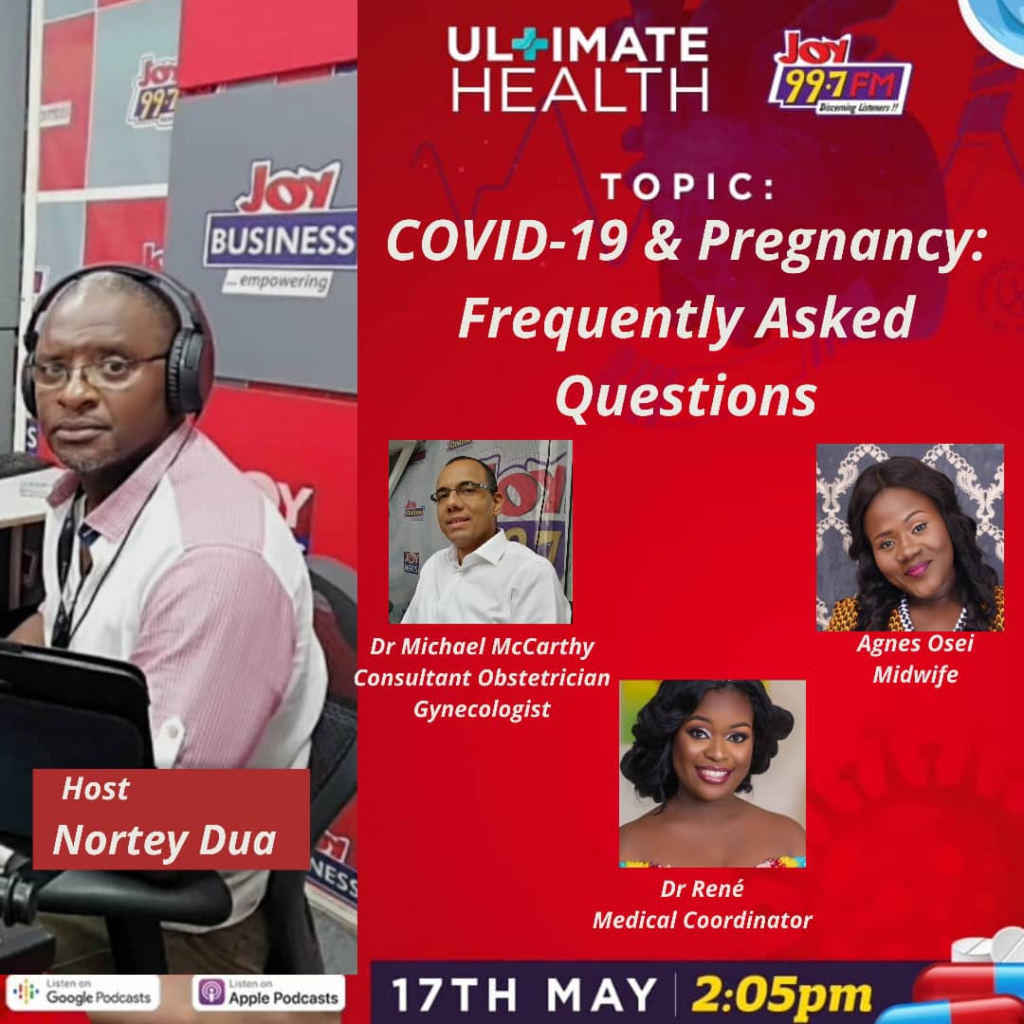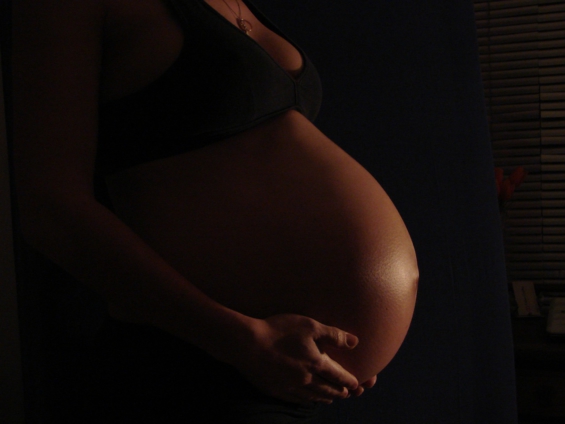As Covid-19 continues to loom, concerns have been raised among pregnant women about the impact of the virus on pregnancy.
Health experts have disclosed that there is no current report to show how Covid-19 may affect a pregnant woman.
However, that is not the only concern some Ghanaian pregnant women are worried about.
Some would like to know if they should take early maternity leave amid the pandemic or whether they can infect their babies.
Speaking on Joy FM’s Ultimate Health Show, Sunday, some health experts educated the public and concerned mothers-to-be to answer the most common questions surrounding Covid-19.

Frequently Asked Questions
- Is pregnancy considered an underlying condition?
Dr Chris Owu, a consultant anesthetist and Head of ICU at the University of Ghana Medical School, Korle Bu Teaching Hospital, and Head of the Covid-19 National case management says no.
“We are not considering it as a comorbidity although we know pregnancy comes with its own issues which in Covid may be exaggerated.”
- Does pregnancy make a woman more vulnerable to Covid-19?
Dr Michael McCarthy, a consultant Obstetrician and Gynaecologist at private hospital, Sinel Specialist Hospital in Tema responded.
“This is a new virus and we are probably yet to take a pregnant woman from beginning all the way through to the end to really understand the full interaction between Covid-19 and pregnancy.
The answer is not all that clear but it looks like from the reports that are coming in, we are not seeing pregnancy as a huge risk as regards to Covid-19. We are all getting the same level of risk exposure, they can get the disease and pregnant women are not immune.
The other thing we need to understand is pregnancy comes with its own complications. A woman can have diabetes as a result of pregnancy, she can get hypertension just as a result of pregnancy and so on. These then become additional comorbidities that may worsen the condition in a covid-19 patient.
We are not sure yet, so we are just being cautious.
- What measures are in place to keep pregnant women who have not tested positive, safe and sound in hospitals?
Dr Owu:
There are many things we do to try to reduce anxiety and manage it. The anxiety comes because women ask these questions; a) how safe is my pregnancy? b) how safe are hospitals, c) how would the delivery be like?
One of the first things we’ve done is try to reduce the contact with the hospitals. We’ve created an online platform. We’ve reduced the frequency of ante-natal visits. So trying to reduce the numbers.
Also we have tried to reduce the total number of patients at the Out Patient department so that people are not crowding.
The protocols at the hospital give some sense of security and safeness. Screening at the entrance, hand washing, and the use of hand sanitizers, distancing at the OPD. Health Workers also give assurance that patients are safe.
So we are trying to reduce the anxiety by putting all these things in place.
- Will a mother who has tested positive for Covid-19 and has delivered successfully be separated from her baby after birth?
Dr Owu:
“No, she will not. Our national guidelines and the obstetricians’ guidelines which are aligned with the World Health Organisation’s guidelines actually says ‘do not separate the mother from the baby’. There are precautions that we take, things that we do and ones that the mother will take as well.
So hand hygiene and the wearing of the masks will still be in effect. The mother is allowed to breastfeed her baby but if for any reason for example, the mother is not well and somebody else has to take care of her baby, they will take similar precautions. If not the woman is allowed to take care of her baby.”
- Can I plan to get pregnant during the Covid-19 pandemic?
Dr McCarthy:
We don’t know everything about Covid-19 and pregnancy yet and so each couple’s situation is unique. There are different scenarios. It’s not a bad time to postpone a pregnancy. If it’s possible to postpone a pregnancy, that’s fine. It may be helpful because we don’t know what’s going to happen in two, three or six months from now. We are hoping it’ll blow over and everything goes down but what if it does not?
We’ve had situations in Ghana where there’s been a shortage of blood because of Covid-19 in lockdown and some patients are not getting the blood that is required for pregnancy-related complications.
So there are ramifications of pregnancy at this time as resources are being directed to other things. There are going to be more complications, not necessarily from the virus but from organisational issues because people may not get to hospital on time, people may not get to hospital at all and more complications may occur.
So if you can avoid pregnancy that is actually not a bad decision. It should be a popular decision.
- If a pregnant woman has to deliver her baby by cesarean how do doctors ensure the baby doesn’t contract Covid-19?
Dr Owu:
There is some uniqueness to Covid-19 in the fact that it is a respiratory virus spread by respiratory secretion as against HIV. There were measures that we already have in place for delivering women who were HIV positive to make sure they do not contract HIV. Similar measures are in place for when we do caesarean section and normal deliveries with a positive mother.
We do not have ample evidence to show that the virus is being transmitted across the placenta. We have looked at breastmilk, and don’t have any evidence that it is transmitted through breast milk. So we encourage them to breastfeed.
- “I’m pregnant and afraid of going to the hospital. What are my options?”
Dr Rene, a medical coordinator and a mother-to-be answered.
It’s about picking the right hospital to go to. Find a hospital where you feel safe, a hospital that puts in all the measures to make it safe for people and you’ll feel comfortable.
- I’m pregnant, how long can I wear a mask for?
A midwife also on the panel, Agnes Osei responded.
Right now we are all protecting ourselves. You can’t tell how safe it is when you go out there and the best measure is for you to put on your face mask. Once you are going out, especially to the hospital, you’re going to meet other people there. It is very safe to put on your face mask.
“Although it seems really scary now, allowing fear to cause you to miss your ante-natal classes is not the best thing now. Rather, try as much as possible to protect yourself. Go the extra mile, get a face shield for yourself, eat well, drink a lot of water, eat a balanced diet and don’t allow the fear to influence you to do the things you’re not supposed to do like taking in concoctions such as herbal mixtures.
Remember that you have a baby inside of you so you can’t try all those things. Do the basic things, and you are good,” Dr Rene additionally advised.
Latest Stories
-
Ebenezer Ahumah Djietror appointed as new Clerk to Parliament
6 minutes -
Actress Benyiwaa of ‘Efiewura’ TV series dead
35 minutes -
Ashanti Regional Chief Imam dies at age 74
1 hour -
Africa Arts Network calls for tax reform to save Ghana’s theatre industry
1 hour -
SSTN Ghana Chapter reaffirms commitment to economic growth under new leadership
1 hour -
Inlaks strengthens leadership team with key appointments to drive growth across sub-Saharan Africa
2 hours -
Green Financing: What Ghana’s Eco-startups need to know
2 hours -
CHAN Qualifiers: Amoah confident of beating Nigeria
2 hours -
Governments deprioritising health spending – WHO
3 hours -
Lordina Foundation brings Christmas joy to orphans
3 hours -
Yvonne Chaka Chaka to headline ‘The African Festival’ this December
3 hours -
Nigerian man promised pardon after 10 years on death row for stealing hens
3 hours -
Patrick Atangana Fouda: A Hero in the fight against HIV passes away
3 hours -
MGA Foundation deepens support for Potter’s Village
3 hours -
Galamsey: One dead, 3 injured as pit collapses at Nkonteng
4 hours

